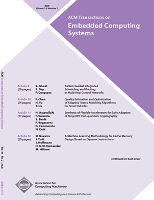
ACM Transactions on Embedded Computing Systems
Scope & Guideline
Connecting researchers and professionals in embedded computing.
Introduction
Aims and Scopes
- Embedded System Design and Optimization:
Research in this area focuses on methodologies for designing and optimizing embedded systems, including hardware-software co-design, energy-efficient architectures, and real-time scheduling. - Machine Learning and AI in Embedded Systems:
This scope encompasses the integration of machine learning and artificial intelligence techniques into embedded systems for applications such as edge computing, IoT, and smart devices. - Security and Privacy in Embedded Computing:
The journal emphasizes research on security protocols, hardware security mechanisms, and privacy-preserving techniques tailored for embedded systems. - Resource Management and Scheduling:
Papers in this area cover dynamic resource allocation, scheduling algorithms, and management frameworks for real-time and mixed-criticality systems. - Fault Tolerance and Reliability:
This focus includes methodologies for ensuring reliability in embedded systems, such as fault detection, recovery mechanisms, and system resilience. - Networking and Communication Protocols:
Research on communication protocols, network-on-chip designs, and efficient data transfer methods for embedded systems is also a significant aspect of the journal. - Energy Efficiency and Sustainability:
The journal promotes research aimed at enhancing energy efficiency in embedded systems, including low-power design techniques and sustainable computing practices.
Trending and Emerging
- Integration of AI and Machine Learning:
There is a significant increase in research integrating AI and machine learning into embedded systems, focusing on applications like real-time inference, adaptive learning, and intelligent decision-making. - Energy-efficient Computing:
Research on energy-efficient designs, particularly for edge computing and IoT applications, is gaining traction as the demand for sustainable technologies grows. - Post-Quantum Cryptography:
As concerns about the security of existing cryptographic methods grow, there is an emerging focus on post-quantum cryptographic techniques specifically tailored for embedded systems. - Tiny Machine Learning (TinyML):
The trend towards TinyML highlights the development of machine learning algorithms that can run on resource-constrained devices, enabling real-time data processing and decision-making. - Cyber-Physical Systems (CPS) and Internet of Things (IoT):
Research on CPS and IoT continues to grow, emphasizing the need for reliable, secure, and efficient systems that can operate in interconnected environments. - Real-time Processing and Edge Computing:
The emergence of edge computing paradigms is reflected in the growing research on real-time processing capabilities for embedded systems, allowing for low-latency applications. - Advanced Security Techniques:
There is a noticeable trend towards more sophisticated security techniques that address vulnerabilities in embedded systems, including hardware-based security measures and secure communication protocols.
Declining or Waning
- Traditional Embedded Systems without AI Integration:
Research focusing solely on conventional embedded systems without the integration of AI or machine learning techniques is becoming less prevalent as the field shifts towards smart and adaptive systems. - Legacy Communication Protocols:
Papers centered on older or less efficient communication protocols are decreasing, as newer protocols that offer better performance and security are taking precedence. - Hardware-centric Designs without Software Considerations:
There is a noticeable decrease in research that purely focuses on hardware designs without considering the software implications, as the trend moves towards more holistic approaches that integrate both aspects. - Static Resource Management Techniques:
Static resource management strategies are being overshadowed by dynamic and adaptive approaches that better address the needs of modern, heterogeneous embedded systems. - Low-complexity Security Approaches:
Simple security measures that do not scale well with the increasing complexity of systems are being phased out in favor of more robust and scalable security frameworks.
Similar Journals
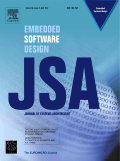
JOURNAL OF SYSTEMS ARCHITECTURE
Advancing Knowledge in Systems DesignJOURNAL OF SYSTEMS ARCHITECTURE is a prestigious academic journal published by ELSEVIER, based in the Netherlands, that has established itself as a leading platform for research in the fields of Hardware and Architecture and Software. With an impressive impact factor and ranked in the Q1 category for both computer science sectors, this journal is recognized for its high-quality contributions, evidenced by its Scopus ranking of #32 in Hardware and Architecture and #74 in Software, placing it in the top percentiles of its field. The journal spans a wide range of topics central to systems architecture, focusing on innovative research that advances the understanding of computer systems and promotes future developments. Researchers, professionals, and students alike will find invaluable insights and emerging trends that address the challenges and opportunities within the rapidly evolving field of systems design and architecture. Spanning from 1996 to 2024, the JOURNAL OF SYSTEMS ARCHITECTURE continues to be a vital resource for those seeking to stay at the forefront of technology and research.
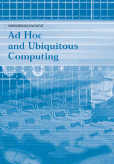
International Journal of Ad Hoc and Ubiquitous Computing
Connecting Ideas in Ad Hoc and Ubiquitous ComputingThe International Journal of Ad Hoc and Ubiquitous Computing, published by InderScience Enterprises Ltd, is a premier platform dedicated to advancing the fields of computer networks, communication systems, hardware, and software architecture. Since its inception in 2005, this journal has served as a critical resource for researchers, professionals, and students aiming to explore the intricate dynamics of ubiquitous computing and ad hoc networks. Though currently not an open-access journal, its scholarly contributions are well-recognized, as evidenced by its rank in the Scopus database, which places it within the lower quartiles of its respective categories. With an increasing focus on innovative solutions in computer science, the journal aims to facilitate knowledge dissemination and encourage interdisciplinary collaborations. Researchers are particularly drawn to the journal for its comprehensive coverage of emerging technologies, making it an invaluable asset in a world increasingly reliant on sophisticated communication infrastructures. As it continues to thrive towards 2024, the journal remains committed to fostering a vibrant academic community.
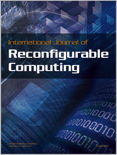
International Journal of Reconfigurable Computing
Pioneering Discoveries in Adaptive Computing SystemsWelcome to the International Journal of Reconfigurable Computing, a leading open-access platform dedicated to the exploration of innovative methodologies and applications in the field of reconfigurable computing. Published by HINDAWI LTD, this journal has been fostering scholarly communication since its inception in 2008. With an ISSN of 1687-7195 and an E-ISSN of 1687-7209, it offers researchers valuable access to the latest advancements and trending research in hardware and architecture, evidenced by its quarterly ranking in the Q4 category for 2023. Researchers, professionals, and students alike will find this journal an invaluable resource for staying updated in a rapidly evolving domain, notwithstanding its current Scopus ranking of 154 out of 177 within its category, reflecting a burgeoning opportunity for growth and engagement in this niche. Submitting their research to the International Journal of Reconfigurable Computing not only connects authors with a global audience but also contributes to the collective advancement of knowledge in this critical area. Explore the vast potential of reconfigurable systems and become part of a community dedicated to pushing the boundaries of computing technology.
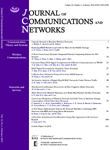
JOURNAL OF COMMUNICATIONS AND NETWORKS
Exploring Breakthroughs in Network Architecture and Data ManagementJOURNAL OF COMMUNICATIONS AND NETWORKS, published by the Korean Institute of Communications Sciences (KICS), is a leading academic journal that has been at the forefront of the fields of Computer Networks and Communications as well as Information Systems since its inception in 1999. With a strong commitment to advancing research in these critical areas, this journal has achieved a prestigious Q1 ranking in both domains as of 2023, reflecting its significant impact and innovative contributions to the field. The journal features original research, review articles, and technical notes that address the latest advancements in communication technologies, network architecture, and data management strategies. As a vital resource for researchers, practitioners, and students, it not only disseminates valuable findings but also fosters collaboration and knowledge exchange among diverse disciplines within the communications landscape. With a consistent annual volume, the journal continues to shape the future of communications science and offers authors an esteemed platform to showcase their work.

Proceedings of the ACM on Measurement and Analysis of Computing Systems
Exploring the Nexus of Measurement and System ReliabilityProceedings of the ACM on Measurement and Analysis of Computing Systems, published by the Association for Computing Machinery, is a pivotal journal in the realms of Computer Science and Engineering, particularly esteemed for its comprehensive focus within the fields of Computer Networks and Communications, Hardware and Architecture, and Safety, Risk, Reliability and Quality. With an impactful presence since its convergence in 2019—and now spanning from 2021 to 2024—this journal upholds rigorous standards, reflected in its classification as Q1 in Computer Science (miscellaneous) and in key safety-related categories. Researchers and professionals will find the journal's emphasis on measurement and analytical solutions critical for advancing computational efficiency and system reliability in real-world applications. The journal does not currently have open access, maintaining its academic rigor and exclusive content that aims to serve the tech-savvy community dedicated to exploring and addressing the challenges within modern computing systems. With Scopus rankings demonstrating a steady impact in the field, particularly recognised within safety and reliability domains, the Proceedings of the ACM stands as an indispensable resource for those seeking to deepen their expertise and contribute to the evolving landscape of computing research.

Cluster Computing-The Journal of Networks Software Tools and Applications
Catalyzing Progress in Software Tools and ApplicationsCluster Computing - The Journal of Networks Software Tools and Applications, published by Springer, is a premier academic journal catering to the vibrant fields of computer networks and software technologies. With an impressive impact factor and recognized as a Q1 journal in both Computer Networks and Communications and Software categories for 2023, it ranks within the top echelons of its field, boasting a Scopus rank of #50 out of 395 and #59 out of 407 respectively, highlighting its influence and reach. The journal, which has been in continuous publication since 2005, serves as a vital platform for groundbreaking research, offering insightful articles and tools that drive innovation in network computing. Researchers, professionals, and students are invited to contribute to and benefit from the dynamic discourse presented in this journal, which is pivotal for advancing knowledge and enhancing practical applications in a rapidly evolving technological landscape.
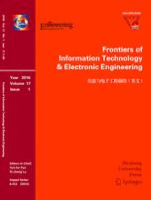
Frontiers of Information Technology & Electronic Engineering
Unleashing Potential Through Cutting-Edge ResearchFrontiers of Information Technology & Electronic Engineering, published by Zhejiang University Press, is a leading academic journal dedicated to advancing the fields of information technology and electronic engineering. With an impressive impact factor and categorized in the Q2 quartile across multiple fields including Computer Networks and Communications, Electrical and Electronic Engineering, Hardware and Architecture, and Signal Processing, this journal serves as a crucial platform for researchers and practitioners to disseminate cutting-edge research and innovations. The journal, which operates under an Open Access model, ensures that high-quality research is accessible to a global audience, fostering collaboration and knowledge sharing within the scientific community. Based in Hangzhou, China, and in operation since 2015, it has rapidly established itself as a reputable source of scholarly articles, ranking in the top percentiles in its respective categories with commendable Scopus rankings. By bridging academic research and practical applications, Frontiers of Information Technology & Electronic Engineering plays a pivotal role in shaping the future of engineering and technology.
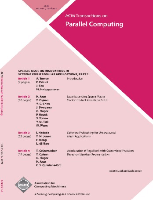
ACM Transactions on Parallel Computing
Elevating Research in Distributed ArchitecturesACM Transactions on Parallel Computing (ISSN: 2329-4949; E-ISSN: 2329-4957), published by the Association for Computing Machinery, stands as a pivotal journal in the field of computer science, particularly focusing on the advancements in parallel and distributed computing. With its convergence years spanning from 2014 to 2024, this journal serves as a significant platform for disseminating cutting-edge research, methodologies, and technologies that shape the future of computational theory, hardware architectures, and effective software solutions. Although it currently holds a Q3 category ranking in various subfields including Computational Theory and Mathematics, and Modeling and Simulation, it continues to attract researchers aiming to contribute to its growing impact in the field. The journal's commitment to fostering knowledge exchange makes it an essential resource for professionals and students eager to navigate the complexities of parallel computing. As the field evolves, ACM Transactions on Parallel Computing remains a critical reference point for innovative research and professional development in computer science.

Journal of Cryptographic Engineering
Exploring the depths of cryptography for a safer digital world.The Journal of Cryptographic Engineering, published by Springer Heidelberg, is a prominent platform dedicated to advancing the field of cryptography and its applications in secure communication and information security technologies. With the ISSN 2190-8508 and E-ISSN 2190-8516, this journal showcases rigorous and innovative research contributions from 2011 to 2024, reflecting its commitment to excellence in academic publishing. Recognized among the Q2 category in Computer Networks and Communications and Software, it ranks impressively within the Scopus framework, securing positions in the 59th and 54th percentiles respectively. The Journal aims to facilitate a comprehensive understanding of cryptographic techniques, promote collaboration among researchers, and provide a vital resource for students and professionals. By maintaining high standards of peer review and providing a platform for cutting-edge research, it plays a crucial role in shaping the future of cryptographic engineering.

FORMAL METHODS IN SYSTEM DESIGN
Pioneering formal methods for robust design.FORMAL METHODS IN SYSTEM DESIGN, published by Springer, is a pivotal journal in the fields of Hardware and Architecture, Software, and Theoretical Computer Science. With an ISSN of 0925-9856 and an E-ISSN of 1572-8102, it has been at the forefront of advancing the understanding and implementation of formal methods since its inception in 1992, with a convergence slated through 2024. Given its ranking in the Q3 category across multiple computer science disciplines, it serves as a critical resource for researchers and practitioners looking to enhance the reliability and performance of complex systems. The journal offers an excellent platform for disseminating high-quality research that addresses the rigorous analytical techniques required for system design, making it invaluable for academics, professionals, and students alike. Notably, FORMAL METHODS IN SYSTEM DESIGN is based in the Netherlands, with its offices located at VAN GODEWIJCKSTRAAT 30, 3311 GZ DORDRECHT, NETHERLANDS, and although it does not currently offer open access, the journal's comprehensive archive remains accessible for deeper research into the formal methodologies that shape contemporary computing paradigms.